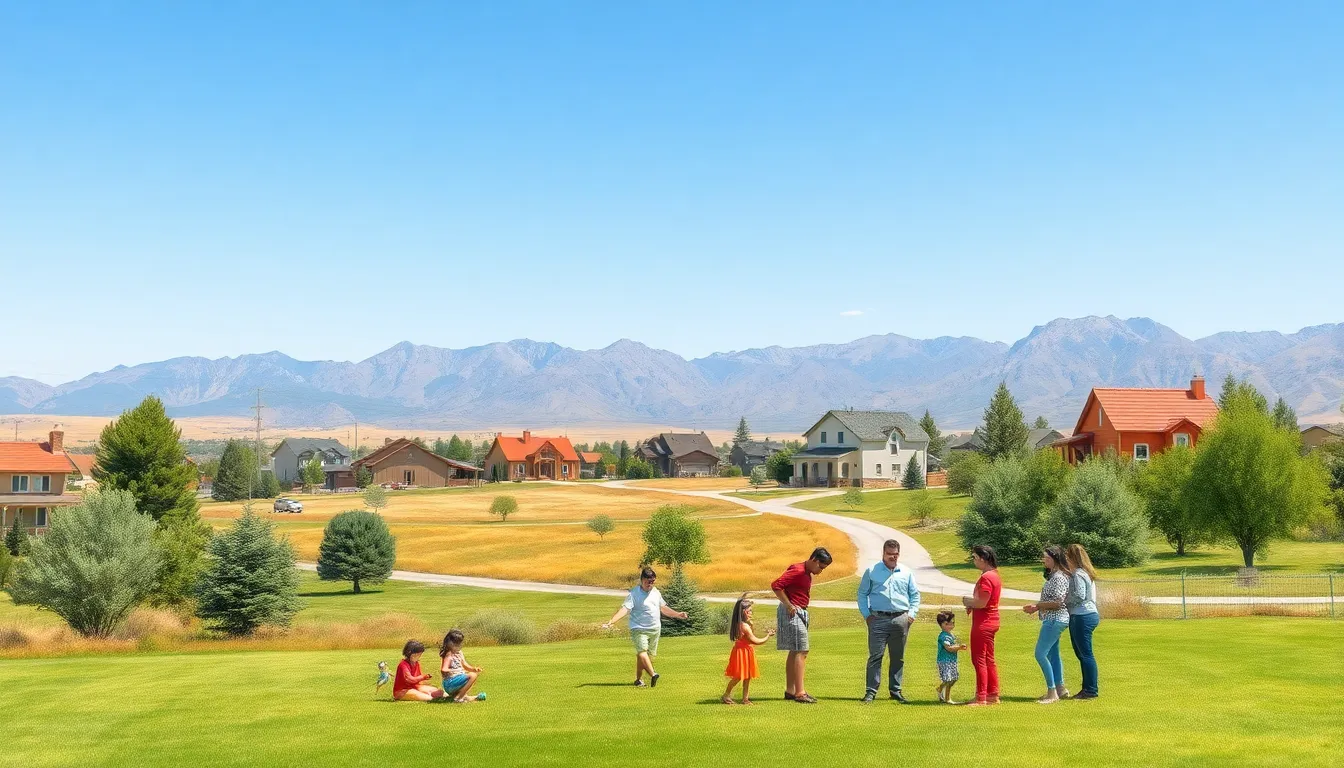In the vast expanse of Nevada, where the desert meets the mountains, lies a hidden gem: rural housing. It’s not just about wide-open spaces and breathtaking views; it’s about finding a slice of serenity away from the hustle and bustle of city life. Imagine sipping coffee on your porch while watching the sunrise over the Sierra Nevada—sounds enticing, right?
But wait, there’s more! Rural living in Nevada offers affordability that urban dwellers can only dream of. With charming communities and a slower pace of life, it’s like stepping into a postcard. Whether it’s a cozy cabin or a sprawling ranch, the options are as diverse as the landscapes. So, if you’re ready to swap the concrete jungle for a charming rural retreat, buckle up. Nevada’s rural housing market is calling, and it’s about to become your new best friend.
Table of Contents
ToggleOverview of Nevada Rural Housing
Nevada’s rural housing market offers a unique blend of affordability and natural beauty. Various communities provide options for individuals seeking tranquil living away from urban chaos. Features such as open spaces, outdoor activities, and scenic landscapes attract many homebuyers.
House prices in rural areas remain significantly lower compared to urban centers. For instance, the median home price in rural Nevada typically ranges from $150,000 to $300,000, depending on location and property type. This affordability allows families and retirees to invest in homes without overspending.
Financing options exist specifically for rural housing. Programs like the USDA Rural Development loan assist buyers with lower income levels, offering favorable terms and low down payment requirements. These programs support the growth of rural communities and help families secure their dream homes.
Many rural areas also benefit from a tight-knit community atmosphere. Residents often enjoy friendly neighbors, local events, and a strong sense of belonging. This communal support enhances the quality of life for those living in Nevada’s countryside.
Job opportunities in rural regions vary from agriculture to tourism. These economic sectors sustain local communities and create diverse employment options. Moreover, remote work possibilities have expanded, allowing professionals to enjoy rural living without sacrificing career growth.
Natural attractions surround rural homes, including national parks, mountains, and lakes. Outdoor enthusiasts appreciate easy access to hiking, camping, and fishing spots. Such features make rural Nevada an appealing choice for nature lovers and adventurous families.
Importance of Rural Housing in Nevada


Rural housing in Nevada plays a crucial role in enhancing community life and providing economic stability. The unique setting offers advantages that appeal to families and retirees alike.
Economic Benefits
Economic growth thrives in rural areas due to affordable living costs. Median home prices range from $150,000 to $300,000, making homeownership feasible for many. Job opportunities in agriculture and tourism foster financial independence. USDA Rural Development loans help lower-income buyers secure financing. This financial support encourages new residents to invest in rural living, strengthening local economies. More residents often lead to increased spending in these communities, further boosting economic viability.
Community Development
Community ties deepen in rural areas, creating a sense of belonging among residents. Small-town settings promote interactions and friendships that enhance the quality of life. Residents engage in local events and contribute to community improvement initiatives. Strong social networks provide support systems for families, enhancing emotional well-being. Housing developments in these communities often prioritize green spaces and public amenities, fostering a healthy lifestyle. This focus on community development attracts new families and encourages a vibrant, inclusive atmosphere.
Challenges Facing Nevada Rural Housing
Rural housing in Nevada faces several significant challenges that impact residents and potential buyers. Addressing these concerns is crucial for sustaining and enhancing the appeal of rural living.
Limited Infrastructure
Limited infrastructure hampers the growth of rural housing. Public transportation options remain scarce, making commuting difficult for residents. Healthcare facilities are often few and far between, creating accessibility challenges for medical services. Wi-Fi access tends to be unreliable, hindering remote work possibilities essential for many families. Educational resources are frequently limited, affecting school quality and availability. Developing the infrastructure will support existing communities and attract new residents to the area.
Affordability Issues
Affordability issues pose a barrier for many potential homebuyers in rural Nevada. While median home prices range from $150,000 to $300,000, many families still struggle to meet the financial demands. Rising property taxes further strain budgets, potentially pushing residents to seek more affordable locations. Income disparities can make it tough for families to secure financing options or save for down payments. Ensuring affordable housing remains a priority is essential for maintaining vibrant rural communities.
Resources for Rural Housing in Nevada
Access to resources can significantly ease the path to finding rural housing in Nevada. Various programs and organizations exist to support potential homeowners and enhance community development.
State and Federal Programs
State and federal programs offer financial assistance and support for rural housing. The USDA Rural Development loan specifically targets low to moderate-income individuals, providing access to affordable financing options. Programs include the Nevada Housing Division’s Home Is Possible initiative, which helps first-time homebuyers with down payment assistance. The Nevada Rural Housing Authority also provides rental assistance and housing support specifically for rural areas. Accessible resources like these foster homeownership and promote stability in local communities.
Nonprofit Organizations
Numerous nonprofit organizations contribute to rural housing development in Nevada. The Nevada Housing Coalition works diligently to advocate for affordable housing initiatives, improving access for families and individuals. Habitat for Humanity operates in several rural areas, building homes for those in need through volunteer efforts and community support. Other nonprofits, such as Rebuilding Together, focus on home repair assistance, ensuring safe living conditions. All these organizations play a vital role in addressing housing challenges and fostering community engagement throughout rural Nevada.





